|
|
|
Sort Order |
|
|
|
Items / Page
|
|
|
|
|
|
|
| Srl | Item |
| 1 |
ID:
170663
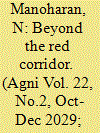

|
|
|
|
|
| Summary/Abstract |
L
eft-wing Extremism (LWE) continues to remain one of the major
challenges to India’s internal security. Its intensity continues to
persist especially in three states – Chhattisgarh, Jharkhand and
Orissa – apart from a significant presence in West Bengal, Bihar, and
Maharashtra. At the same time, the left-wing extremists have
successfully managed to penetrate in some of the states of the
northeast and south India, and into a few urban areas. Interestingly,
there is a reduction in the number of middle and top-level Maoist
leaders due to killings, arrests or surrenders. Yet, one still cannot
assert with confidence that Left-wing Extremism is on the wane.
Significantly, the spread of Naxals beyond the ‘Red Corridor’ and their
external links are a cause for concern
|
|
|
|
|
|
|
|
|
|
|
|
|
|
|
|
| 2 |
ID:
127681
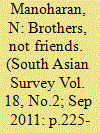

|
|
|
|
|
| Publication |
2011.
|
| Summary/Abstract |
Mahatma Gandhi referred to Sri Lanka as India's 'daughter state'. True to this metaphoric observation, relations between the two countries have been by-and-large cordial, but occasionally not devoid of irritants. India is Sri Lanka's closest, most important and powerful neighbour. Relations between the two neighbours stretch to more than two millennia in wide-ranging areas-political, economic, socio-cultural and military. Common colonial experience under Britain led both countries to have similar world views, yet certain strategic imperatives and national interests dictated differing policies, at times conflicting with each other. India has always stood by Sri Lanka and time-and-again reiterated its unambiguous support to safeguarding the latter's unity, territorial integrity and sovereignty. Despite witnessing various ups and downs, the bilateral ties between the two countries have never been bad to a level of confrontation. They have in fact matured over a period of time and, in the present context, serve as a model of good neighbourly interaction.
|
|
|
|
|
|
|
|
|
|
|
|
|
|
|
|
| 3 |
ID:
188869
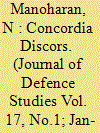

|
|
|
|
|
| Summary/Abstract |
India is a classic case of a ‘quasi-federal’ country. There is a plethora of literature available separately on the Indian armed forces and Indian federalism. However, the deployment of India’s Central Armed Forces in its federal units (States) is one of the most understudied and unexplained areas of research. To avert any grave disorder in the country, the Centre constitutionally enjoys power regarding the deployment of its armed forces in the federal units. However, in practice, there are various factors that come into play during the deployment. This study intends to throw light on the various aspects of force deployment: the rationale, the legal cover, and the state of civil power of the federal units during such deployment. In the process of inquiry, the study has relied on various primary sources that are available in the form of Indian Constituent Assembly Debates, the Constitution, pertinent legislations, parliamentary debates, judicial pronouncements, and government reports. In the end, the study offers certain policy recommendations for consideration.
|
|
|
|
|
|
|
|
|
|
|
|
|
|
|
|
| 4 |
ID:
117808
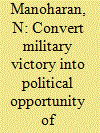

|
|
|
| 5 |
ID:
080515
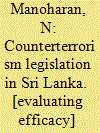

|
|
|
|
|
| Publication |
Washington, D C, East-West Center Washington, 2006.
|
| Description |
viii, 66p.
|
| Series |
Policy studies; no.28
|
| Standard Number |
9781932728545
|
|
|
|
|
|
|
|
|
|
|
|
Copies: C:1/I:0,R:0,Q:0
Circulation
| Accession# | Call# | Current Location | Status | Policy | Location |
| 052941 | 363.32095493/MAN 052941 | Main | On Shelf | General | |
|
|
|
|
| 6 |
ID:
169378
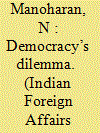

|
|
|
| 7 |
ID:
081839
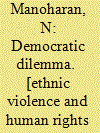

|
|
|
|
|
| Publication |
New Delhi, Samskriti, 2008.
|
| Description |
xxv, 279p.
|
| Standard Number |
9788187374503
|
|
|
|
|
|
|
|
|
|
|
|
Copies: C:1/I:0,R:0,Q:0
Circulation
| Accession# | Call# | Current Location | Status | Policy | Location |
| 053504 | 305.80095493/MAN 053504 | Main | On Shelf | General | |
|
|
|
|
| 8 |
ID:
120258
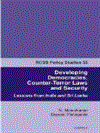

|
|
|
|
|
| Publication |
New Delhi, Manohar Pub and Dist, 2013.
|
| Description |
103p.pbk
|
| Series |
RCSS Policy Studies 52
|
| Standard Number |
9788173049903
|
|
|
|
|
|
|
|
|
|
|
|
Copies: C:1/I:0,R:0,Q:0
Circulation
| Accession# | Call# | Current Location | Status | Policy | Location |
| 057283 | 321.801/MAN 057283 | Main | On Shelf | General | |
|
|
|
|
| 9 |
ID:
156051
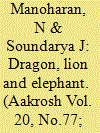

|
|
|
| 10 |
ID:
133673
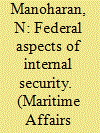

|
|
|
|
|
| Publication |
2014.
|
| Summary/Abstract |
The characteristics of Indian federalism are unique. The uniqueness is conspicuous by its dual character: "federal during normal times, but unitary in times of war". The study examines how such a federal set-up impinges on India's internal security management, including maritime and coastal security. Despite being in a stronger position constitutionally, the Centre has not been assertive. Finding out various reasons for the Union's hesitancy, the study advocates a stronger role for the Centre in internal security issues. The main reason being the threat matrix to India's internal security is such that it is beyond the capability of the States of India to counter them on their own, effectively. After analysing various constitutional and legal aspects of internal security, the study makes some key recommendations. It advocates the need for the Centre and the States to combine their efforts instead of blaming each other for internal security problems. "Cooperative Federalism" instead of "Competitive Federalism" is the suitable way ahead.
|
|
|
|
|
|
|
|
|
|
|
|
|
|
|
|
| 11 |
ID:
157793
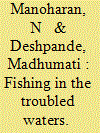

|
|
|
|
|
| Summary/Abstract |
India’s relations with its neighbours in the maritime domain have received less scholarly attention. Those studies that deal with India’s relations with its South Asian neighbours generally touch on political security, socio-cultural and economic issues. The maritime aspect is either ignored or tucked in as a part of other dimensions. The present study attempts to fill the gap in the literature by taking up the case of Sri Lanka. Sri Lanka is chosen as a case, not only because the island state is India’s closest maritime neighbour but also due to the existence of deep interactions between the two countries in diverse fields both at governmental and non-governmental levels. In the maritime domain, in the present context, technically speaking, there is no problem between the two countries. However, the fishermen issue remains one of the issues principally because of the Tamil Nadu factor. Analysing the issue in five phases, the study argues for a ‘comprehensive approach’ for its settlement.1
|
|
|
|
|
|
|
|
|
|
|
|
|
|
|
|
| 12 |
ID:
150854
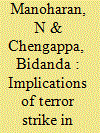

|
|
|
| 13 |
ID:
149161
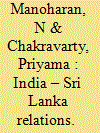

|
|
|
| 14 |
ID:
089276
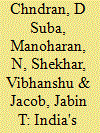

|
|
|
| 15 |
ID:
128437
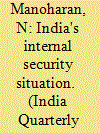

|
|
|
|
|
| Publication |
2013.
|
| Summary/Abstract |
Challenges to internal security of India are numerous. The extent and scope of threats are complex, varied and vast. No other country in the world confronts so many threats, with so much intensity, at the same time. Overall, more than 50 per cent of India is said to be affected by one or the other of these threats, which are not just 'law and order' problems. They have increasing external dimension falsifying conventional wisdom that internal security threats are caused mainly by internal sources. They threaten the body politic like a 'cancer'. The state of poor internal security situation is not because of India's unfavourable strategic environment but also due to weak internal security mechanism, especially its criminal justice system. In this context, the article argues that if appropriate actions are not taken, the threats may result in the gradual degradation of the Indian State. It suggests renewed set of policies and mechanisms in political, economic, socio-cultural, military and diplomatic arena.
|
|
|
|
|
|
|
|
|
|
|
|
|
|
|
|
| 16 |
ID:
096761
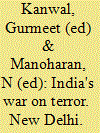

|
|
|
|
|
| Publication |
New Delhi, KW Publishers, 2010.
|
| Description |
xvi, 296p.
|
| Standard Number |
9789380502069, hbk
|
|
|
|
|
|
|
|
|
|
|
|
Copies: C:1/I:0,R:0,Q:0
Circulation
| Accession# | Call# | Current Location | Status | Policy | Location |
| 055009 | 303.6250954/KAN 055009 | Main | On Shelf | General | |
|
|
|
|
| 17 |
ID:
126768
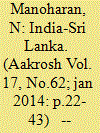

|
|
|
| 18 |
ID:
182610
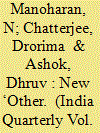

|
|
|
|
|
| Summary/Abstract |
One of the key terms to understand the nature of violence and conflicts world over is ‘radicalisation’. Sri Lanka’s case is instructive in understanding the various dimensions of Islamic radicalisation and de-radicalisation, especially in South Asia. Though a small state, Sri Lanka has witnessed three radical movements, the latest being Islamic that got manifested in deadly Easter attacks of April 2019. Eco-space for Islamic radicalisation existed in the island for decades, but the rise of ultra-Sinhala-Buddhist nationalism post the end of Eelam War IV acted as a breaking point. The underlying context is perceived as the feeling of insecurity projected by hardline Sinhala-Buddhist elements. In due course, the primary ‘other’ shifted from Tamils to Sri Lankan Muslims. Apart from inter-communal dissonance, international jihadist network also fostered radicalisation process in the island’s Muslim community. Political instability due to co-habitation issues between the then president and the prime minister was a perfect distraction from the core security and development issues. In response to the violent manifestation of radicalisation, de-radicalisation measures by the successive Sri Lankan governments were mostly military in nature. Socio-economic and political components of Islamic de-radicalisation are at the incipient stage, if not totally missing. The article suggests wide-ranging measures to address the issue of radicalisation in the island state.
|
|
|
|
|
|
|
|
|
|
|
|
|
|
|
|
| 19 |
ID:
154400
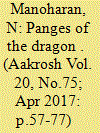

|
|
|
| 20 |
ID:
164334
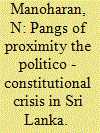

|
|
|
|
|
|
|
|